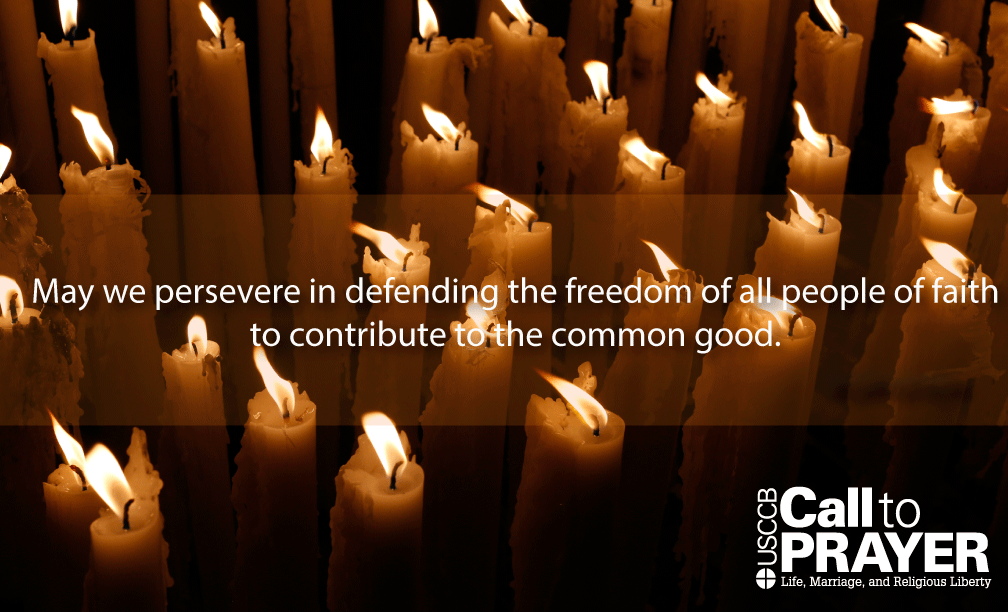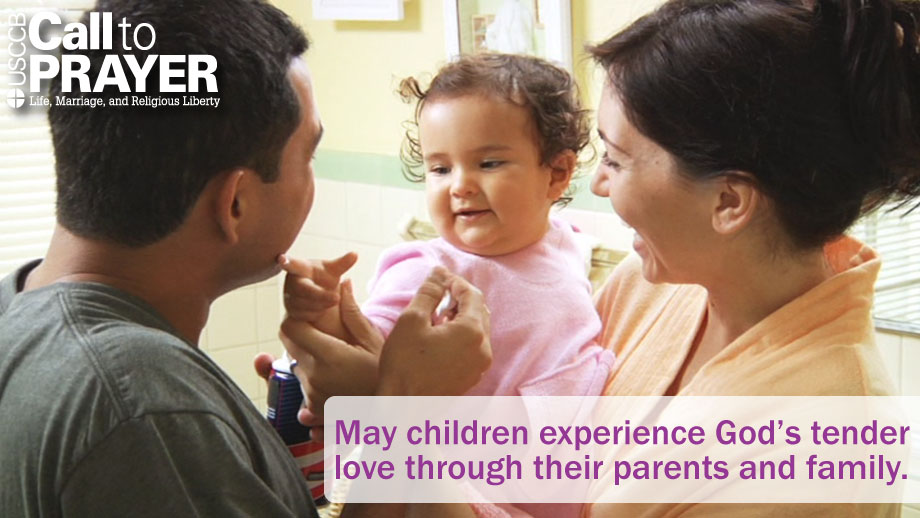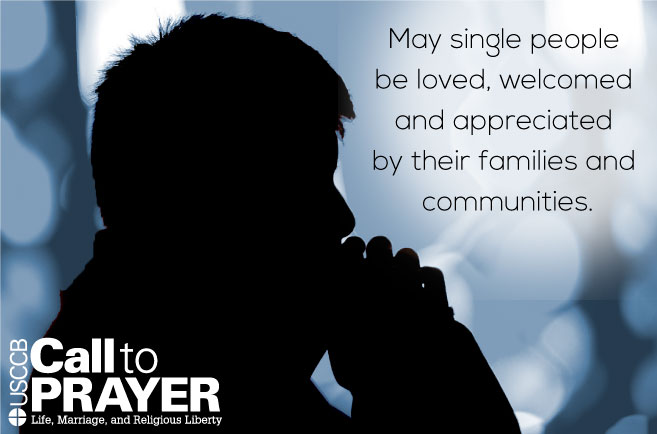Call to Prayer: April 29, 2016
Archive
AL Bootcamp
Pope Francis’s Amoris Laetitia came out on April 8th—how much have you read? If you need a little push, take the AL Challenge with us! We will read a small bit from Chapter 4 (Love in Marriage) and ask you to do something related to it for your marriage every day.
We will post it week-by-week so that if you’d prefer to print it out and put it on your fridge, that’s always a good option! They will also be up on our social media sites.
Sundays are your “day of rest” but that doesn’t mean you should slack off on your love 🙂
April 25
“Love is patient (1 Cor 13: 4)
Pope Francis: “The first word used is makrothyméi…Its meaning is clarified by the Greek translation of the Old Testament, where we read that God is ‘slow to anger’ (Ex 34:6; Num 14:18). It refers, then, to the quality of one who does not act on impulse and avoids giving offense… God’s ‘patience’, shown in his mercy towards sinners, is a sign of his real power” (Amoris Laetitia, no. 91).
Today, be aware of when you are tempted to be angry at your spouse, children, parents, or other relatives. Take a deep breath and remember that your first reaction is not always the most helpful or truest to the love that you have for that person. Also try to consider how your words will be taken before you say them, and whether the time is right to bring something up.
April 26
“Let all bitterness and wrath and anger and clamor and slander be put away from you, with all malice” (Eph 4:31).
Pope Francis: “We encounter problems whenever we think that relationships or people ought to be perfect, or when we put ourselves at the center and expect things to turn out our way. Then everything makes us impatient, everything makes us react aggressively. Unless we cultivate patience, we will always find excuses for responding angrily. We will end up incapable of living together, antisocial, unable to control our impulses, and our families will become battlegrounds” (Amoris Laetitia, no. 92).
How many times do you find yourself frustrated at the imperfections of others in your family? Today, when something doesn’t go your way (and there will always be something!) tell yourself to stay calm and put it in perspective. Will it matter tomorrow?
April 27
“Love is patient” (1 Cor 13:4).
Pope Francis: “Patience takes root when I recognize that other people also have a right to live in this world, just as they are. It does not matter if they hold me back, if they unsettle my plans, or annoy me by the way they act or think, or if they are not everything I want them to be. Love always has an aspect of deep compassion that leads to accepting the other person as part of this world, even when he or she acts differently than I would like” (Amoris Laetitia, no. 92).
Deep down, if we are being honest, we may expect everyone else to think like we do; or if they don’t, they should. Today, take the time to consciously appreciate one or two things that your spouse, children, or other family members do better than you, and recognize that they put up with your imperfections just as much as you put up with theirs!
April 28
“Love is kind…” (1 Cor 13:4).
Pope Francis: “The next word that Paul uses is chrestéuetai. The word is used only here in the entire Bible. It is derived from chrestós: a good person, one who shows his goodness by his deeds… Paul wants to make it clear that ‘patience’ is not a completely passive attitude, but one accompanied by activity, by a dynamic and creative interaction with others” (Amoris Laetitia, no. 93).
Sometimes saying that someone is a “good person” is a way of excusing bad choices they’ve made; but being good is a prerequisite of holiness, really. Show me a saint who couldn’t be first called a “good person”! What can you do today that may make others think, “Wow, he/she is just such a good person”?
April 29
“Love is kind” (1 Cor 13:4).
Pope Francis: “Throughout the text, it is clear that Paul wants to stress that love is more than a mere feeling. Rather, it should be understood along the lines of the Hebrew verb ‘to love’; it is ‘to do good’” (Amoris Laetitia, no. 94).
We don’t always feel like loving, but we know that when we fail to love, that doesn’t make us happy. Plan ahead today in order to love in action: put an extra granola bar in your purse to give to the man who stands at the corner where you work. Think about what might make your wife smile if she finds it in the middle of a day at home. Plan ahead to do good.
April 30
“Love is shown more by deeds than by words.” – St. Ignatius of Loyola
Pope Francis: “[Love] thus shows its fruitfulness and allows us to experience the happiness of giving, the nobility and grandeur of spending ourselves unstintingly, without asking to be repaid, purely for the pleasure of giving and serving” (Amoris Laetitia, no. 94).
Today, pick one of the services that your spouse usually provides and get to it before them as a surprise. Dishes, laundry, picking up the kids’ soccer stuff— beat them to it!
Archive
Call to Prayer: April 22, 2016
Archive
Call To Prayer: April 15, 2016
Archive
A Motherly Love: Single People and the Family
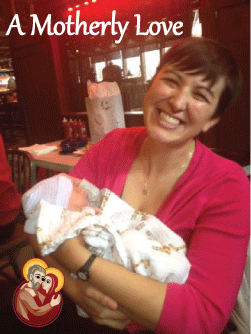 Lori was my first friend to have a baby. I looked at this little person in her arms and thought about how blessed Therese was to have Lori and Tim as her parents. She had such a thoughtful expression, this baby girl. I was never one for babysitting, but I could come through in a pinch and struggle my way through reading baby signs that I was never taught (and no, this knowledge doesn’t come automatically with XX chromosomes!). Slowly, as more and more of my friends married and had children, rather than feeling myself more distant from them in my single state, I felt carried along, almost as if I was likewise becoming a mother, albeit not in the same way. I know allllllll sorts of things about pregnancy, childbirth, and raising children now, even though I haven’t gone through any of it myself. I feel towards my friends’ children a fierce protectiveness and a tender affection. I know their temperaments and have seen them on good days and bad days.
Lori was my first friend to have a baby. I looked at this little person in her arms and thought about how blessed Therese was to have Lori and Tim as her parents. She had such a thoughtful expression, this baby girl. I was never one for babysitting, but I could come through in a pinch and struggle my way through reading baby signs that I was never taught (and no, this knowledge doesn’t come automatically with XX chromosomes!). Slowly, as more and more of my friends married and had children, rather than feeling myself more distant from them in my single state, I felt carried along, almost as if I was likewise becoming a mother, albeit not in the same way. I know allllllll sorts of things about pregnancy, childbirth, and raising children now, even though I haven’t gone through any of it myself. I feel towards my friends’ children a fierce protectiveness and a tender affection. I know their temperaments and have seen them on good days and bad days.
I was reading a book by a fountain one day, and a young mother was there with her toddler. The little boy was running around making noise, trying to balance and jump. His mother said, “I’m sorry,” for disturbing me, and I said, “Oh no, it’s fine,” and then caught myself before I said what came spontaneously to mind, which was, “I have a bunch of kids too, I know what that’s like.” As she walked away, I thought about how naturally that came to me and how it explains my attitude toward all children. Once this gift of spiritual motherhood is perfected, I hope that one day I will resemble the woman in C.S. Lewis’s The Great Divorce:
And who are all these young men and women on each side?”
“They are her sons and daughters.”
“She must have had a very large family, Sir.”
“Every young man or boy that met her became her son – even if it was only the boy that brought the meat to her back door. Every girl that met her was her daughter.”
“Isn’t that a bit hard on their own parents?”
“No. There are those that steal other people’s children. But her motherhood was of a different kind. Those on whom it fell went back to their natural parents loving them more. Few men looked on her without becoming, in a certain fashion, her lovers. But it was the kind of love that made them not less true, but truer, to their own wives.”
Since I never have my own baby on my hip, I’m always there at a party or event to hold one so that mom or dad can eat. Since I don’t have to look around for any mischief my own toddler is getting into, I can give my full attention to someone else’s who wants to show me his latest Lego creation. I have grown so much and experienced such grace even in the midst of the suffering of being the only person in the room who is not married or does not have children, as long as God remains my focus.
One day, that same little Therese, years later, was talking with her mom about vocations. Lori told her about the calling to religious life and the gift of marriage. Then she said, “And some people serve God in a single life.” Therese responded, “Like Miss Sara?” “Yes, like Miss Sara.”
—————————————
Sara Perla is Program Specialist for the Subcommittee for the Promotion and Defense of Marriage
Archive
The Bishops on Amoris Laetitia
If you’d like to know what the bishops think about the new apostolic exhortation, read their statements!
First, from the Chairman of Laity, Marriage, Family Life and Youth, Bishop Malone of Buffalo
Archive
Call to Prayer, April 8, 2016
Archive
Intern Post: The Mercy of Indissolubility
Growing up with three brothers, I remember a lot of forced apologies being exchanged back and forth between us. My parents would make us say the words before we were actually ready to apologize for (or forgive) whatever nastiness was inflicted that day. But however hurt or angry we were at the moment, there was never a question in our minds about whether we loved one another. We belonged to each other and wouldn’t have had it any other way. Being family and loving one another went hand-in-hand.
Love sees beyond what is broken, rude, selfish, or mean in the other person’s action and reaches out a hand to heal the relationship. By making my brothers and me practice forgiveness in the everyday offenses of life, my parents were leading us to understand mercy: it makes things right between us.
Throughout the Old Testament we see a cycle of betrayal and mercy played out between Israel and the Lord. Over and over, Israel abandons God for their own desires, but the Lord continually draws her back to himself because he chose her and he is faithful to the covenant he made. In the book of Hosea in particular, the relationship of a married couple is used to reveal the steadfastness of God’s love for Israel. No matter what she does, He remains faithful.
A sacramental marriage helps those who witness it to understand God’s fidelity to his people. Indissolubility is a gift of mercy, because it makes the relationship of the couple true to what love is: a complete gift of oneself that can’t be taken back. A person in love does not promise their beloved the next three years; they promise forever![1] “The gift of indissolubility means that despite the vicissitudes and suffering that come with human failure and sin, the sacramental marriage bond remains an abiding source of mercy, forgiveness, and healing.”[2] To deny the indissolubility of marriage would be an affront against the sacrament of marriage because it would deny the reality of grace and its power to heal and perfect a person.
I came across a beautiful reflection about marriage recently on a blog site. A woman was reflecting on her experience of learning to have mercy on her husband who was struggling with clinical depression. She said, “Through mercy, God taught me to love my husband as we all deserve to be loved—with a love devoid of self, thinking only of the good of the other person.”[3] While her husband was sick, she, “picked up his cross for him, as Jesus does for us, and bore his malaise and withdrawal in loving silence.” By showing mercy rather than demanding justice, the couple was able to maintain peace and goodwill during his illness. Mercy itself is not a cure for depression, but it helped this couple to preserve their relationship in a difficult time. The wife realized that she needed to be kind and selfless, and not seek justice but rather have mercy, and finally when she did that she found, “I no longer cared about justice.”
It can be said of the practice of reconciliation that it “washes away small offenses, but it also protects from great offenses. Pardon confers a habitus of communion.”[4] Mercy towards siblings, in my case, and a husband in the case of the blog contributor is an expression of a disposition toward communion. It is a desire to be united to the other person, even after they have hurt you. A married couple that frequently seeks and offers mercy reinforces their “togetherness” or communion so that when serious trials arise they have already practiced drawing towards one another. The indissoluble bond of marriage not only calls a couple to be merciful toward each other, but indissolubility also reveals God’s own mercy, because when he binds two people together in the sacrament, he gives them the graces they need to live it out.
[1] There is a new concept about marriage out there these days called a “wed-lease,” which turns marriage into something more like a business contract: https://www.washingtonpost.com/opinions/a-high-divorce-rate-means-its-time-to-try-wedleases/2013/08/04/f2221c1c-f89e-11e2-b018-5b8251f0c56e_story.html. This is not true to what love is.
[2] Healy, N. (2014). The Merciful Gift of Indissolubility. Communio International Catholic Review, 41.2. Retrieved from http://www.communio-icr.com/files/healy41-2.pdf
[3] “Ode to Feminine Genius: A Merciful Woman.” Catholic Sistas. Aug. 28, 2014. http://www.catholicsistas.com/2014/08/ode-feminine-genius-merciful-woman/
[4] Laffitte, J.(2015). The Choice of the Family. New York: Image, p. 143.
Written by the Spring Intern in the Promotion and Defense of Marriage Secretariat.
Archive
Unsung Family Heroes: Single People and the Family
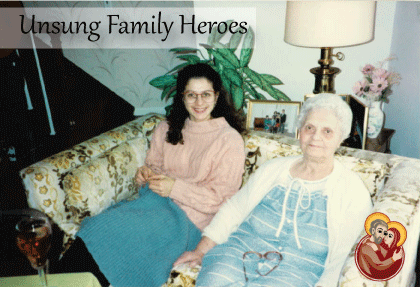 Have you ever noticed in families that there is always someone who cares for people? Parents care for children. Siblings care for each other. What, however, about the extended family? Does anyone else in the family extend such care? In my family, I can tell you that single aunts, uncles, and cousins are at the forefront of helping each other. They are often the unsung family heroes. I know because I have seen this first hand.
Have you ever noticed in families that there is always someone who cares for people? Parents care for children. Siblings care for each other. What, however, about the extended family? Does anyone else in the family extend such care? In my family, I can tell you that single aunts, uncles, and cousins are at the forefront of helping each other. They are often the unsung family heroes. I know because I have seen this first hand.
My family is a large Italian-American one. My mother is the last of twelve and my father is fourth in a line of nine. As you can imagine, many relatives in this clan have married and had their own children, who have had children as well. But some have not married (like me). And, others have remained single after either losing a spouse to an illness or through the sadness of divorce. I have witnessed the rich contributions to the life of the family in the example of my single cousins, uncles, and aunts.
Among my single family members the characteristic of generosity of time and talents is notable. There is Cousin Manuel for example, who would spend hours on a Saturday afternoon teaching my sisters and I about opera. Or, Uncle Jazz who throws a big Christmas eve party complete with all the traditional Italian fish dishes (at least as far as the Notare family defines them!). Or Cousin Giovina, who after her father died immediately took her mother to live with her and was always ready to pitch in to help someone in need. Probably the most representative of this clan is Aunt Rosie.
After Aunt Rosie’s husband died in her early forties, she remained single until she died at age ninety-one. Aunt Rosie devoted herself to taking care of the entire Jannicelli clan (that would be my mother’s side of the family). Aunt Rosie’s generosity was legendary. She didn’t have much money (her profession had been a cook in a large public school). Her generosity came in the form of the gift of herself and her many talents. At any given moment in a day she could be found doing something for someone, especially a family member.
For example, Aunt Rosie was a marvelous cook. She never tired of cooking for others or teaching others how to cook. But beware, if you borrowed one of her recipes, it was always from her public school cooking days and often called for enormous amounts of ingredients like twenty-pounds of butter and forty pounds of flour! In the days before the Internet, if you had a cooking question, you would undoubtedly call Rose Rocha to find out what to do. She always had the right answer.
More importantly however, Aunt Rosie nurtured family members. She looked after not only her own children, but those of her siblings. If one relative wasn’t treating another right, Aunt Rosie would step in and ensure that justice and family unity prevailed. For the children, Aunt Rosie would listen to childish stories about friends and school. She could also be found playing silly games—like dancing for me like a “real ballerina!” Aunt Rose gave sage advice to all and was the life of the party (singing old American or Italian songs).
Aunt Rosie checked in on family members regularly, always giving the gift of her time. And, lest you think she was merely a fun-loving party girl, she had the gumption to handle the most difficult of problems. So if, for example, someone was seriously sick, she not only would be there to help, but would call other family members as well to pitch in. It was Aunt Rosie who led the family team who cared for my dying grandmother, uncles, and grandfather. Rose Rocha didn’t mind getting her hands dirty and certainly understood the cost of love in hard times.
Much later in life, long after Aunt Rosie died, I realized the lessons I had learned from her. The most important being that despite the struggles in life, love poured out on others makes for a very happy life. In Aunt Rosie I had the example of a joyful, vibrant, and happy single woman who blossomed in the heart of the family. Aunt Rose set the tone for how a single family member can enrich the family!
______________________________________
Theresa Notare, PhD is the Assistant Director of the Natural Family Planning Program of the Secretariat of Laity, Marriage, Family Life and Youth, USCCB


